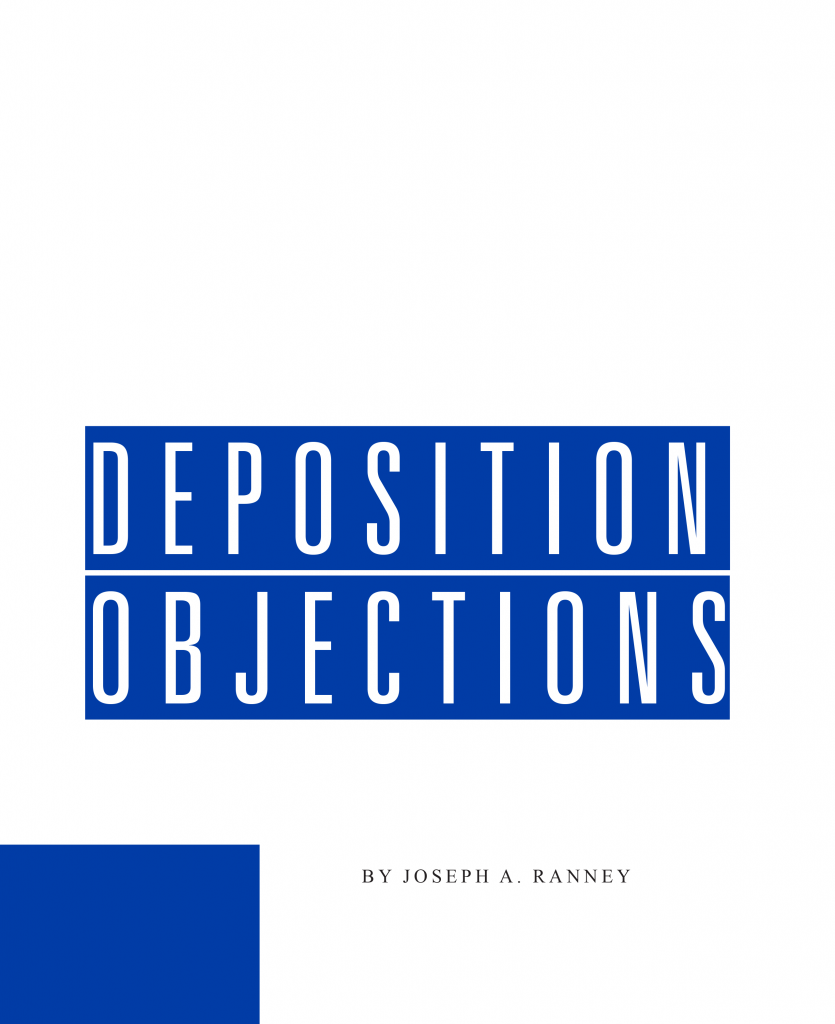Deposition Objections

Table of Contents
I. BEFORE THE DEPOSITION
- Chapter 1 Objecting to Deposition Notices and Subpoenas
- Chapter 2 Motions to Quash or Limit Deposition Subpoenas
- Chapter 3 Preparing Witnesses for Deposition Objections
II. GROUNDS FOR OBJECTING TO DEPOSITION QUESTIONS
A. Objections Based on Privilege and Confidentiality
- Chapter 4 Attorney-Client Privilege
- Chapter 5 Attorney Work Product Privilege
- Chapter 6 Proprietary and Confidential Information
- Chapter 7 Witness Self-Incrimination
- Chapter 8 Family Communications Privileges
- Chapter 9 Privileges for Communications With Professionals
- Chapter 10 Privacy Privilege
- Chapter 11 Legal Process Privileges: Law Enforcement Records, Deliberative Process, Settlement Discussions
B. Objection Based on Other Grounds
- Chapter 12 Relevance: Overbroad and Burdensome Questions
- Chapter 13 Vagueness, Ambiguity, Repetition, and Lack of Foundation
- Chapter 14 Legal Conclusions
III. PROCEDURAL ISSUES DURING THE DEPOSITION
- Chapter 15 Court Rulings and Supervision During a Deposition
- Chapter 16 Instructing the Witness Not to Answer a Question
- Chapter 17 Coaching and Communications With the Witness During Breaks
- Chapter 18 Colloquies and Stipulations Among Counsel
- Chapter 19 Motions to Strike and Clarification of Testimony
IV. SPECIAL SITUATIONS
- Chapter 20 Objections at Expert Witness Depositions
- Chapter 21 Objections to Testimony of Witnesses You Do Not Represent
- Chapter 22 Objections to Videotape Depositions
- Chapter 23 Objections at Depositions of Non-English Speaking Witnesses
- Chapter 24 Objections to Attendance of Unauthorized Persons
V. AFTER THE DEPOSITION
- Chapter 25 Making and Opposing Motions to Compel Deposition Testimony
- Chapter 26 Reviewing and Correcting the Deposition Transcript
APPENDIX 1 WHERE TO FIND RULES RELATING TO DEPOSITIONS
TABLE OF CASES
TABLE OF AUTHORITIES
INDEX
This edition adds new text, tips, and more than 100 cases to help you protect your witness and your case. Revisions and additions include:
Chapter 1 OBJECTING TO DEPOSITION NOTICES AND SUBPOENAS
Proportionality (§1:80):
- New Federal Rule that all discovery must be “proportional to the needs of the case”
Chapter 8 FAMILY COMMUNICATIONS PRIVILEGES
What Marital Interactions Are “Spousal Communications”? (§8:11):
- Exception to privilege can extend to cases of abuse of any child in the home
Do the Privileges Apply to Same-Sex Marriages and Cohabitation? (§8:24):
- Extension of privileges based on legalization of same-sex marriage in Obergefell v. Hodges(2015) and whether the privileges apply to pre-Obergefell communications
Chapter 10 PRIVACY PRIVILEGE
Privacy in the Age of Social Media (§10:04)
- Discoverability of social-network system information (such as Facebook, Twitter, Linked In)
- The showing that a party must make in order to obtain information access to which is restricted by system user
Chapter 14 LEGAL CONCLUSIONS
Preparing Organization Representatives (§14:52):
- What to do when the opposing party says that a representative’s answers are inadequate and demands a supplemental deposition
- Whether contention questions are allowable in depositions of organization representatives whose answers will bind the organization
Chapter 20 OBJECTIONS AT EXPERT WITNESS DEPOSITIONS
Attorney Communications With Expert Witnesses: Privacy in the Age of Social Media (§20:03)
- Practical effect of 2010 amendments to Federal Rules of Civil Procedure, which protect many attorney-expert communications from disclosure
Objection: Opinion Testimony Standards and Applicable Legal Standards (§20:11)
- Practical effect of 2010 Federal Rules amendments on discoverability of bases of opinion testimony
Draft Materials and Draft Reports Generated by the Expert (§20:13)
- Practical effect of 2010 Federal Rules amendments on discoverability of materials prepared by expert



